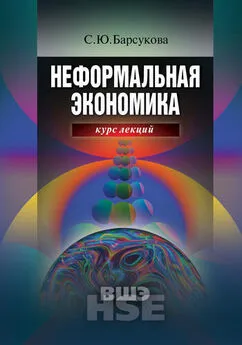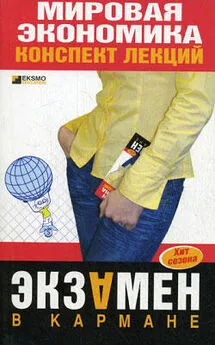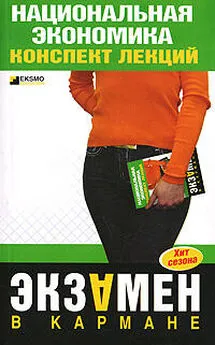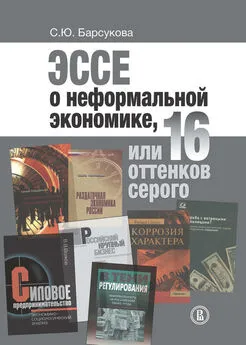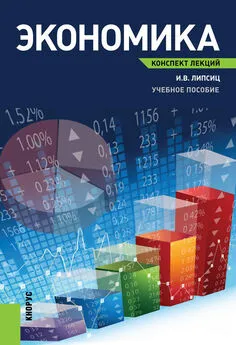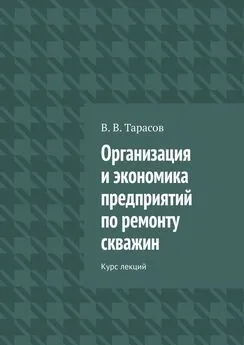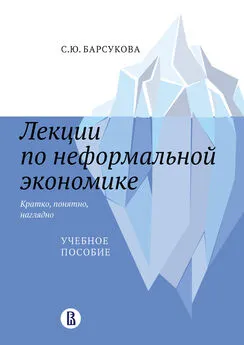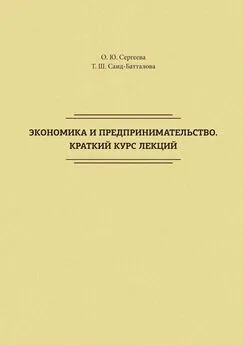Светлана Барсукова - Неформальная экономика. Курс лекций
- Название:Неформальная экономика. Курс лекций
- Автор:
- Жанр:
- Издательство:неизвестно
- Год:неизвестен
- ISBN:нет данных
- Рейтинг:
- Избранное:Добавить в избранное
-
Отзывы:
-
Ваша оценка:
Светлана Барсукова - Неформальная экономика. Курс лекций краткое содержание
Учебное пособие посвящено изучению неформальной экономики. Неформальная экономика – деятельность экономических агентов, не регулируемая законами и контрактами, не облагаемая налогами и не фиксируемая статистикой. Рассматриваются экономические практики как нарушающие законы, так и не подпадающие под их регулирование. Соответственно в курсе речь идет об экономиках теневой и криминальной, а также об экономиках домохозяйств и межсемейных обменов. Актуальность курса обусловлена масштабом и социально-экономическими последствиями неформального хозяйствования. Лекции последовательно знакомят с мировыми тенденциями в развитии неформальной экономики и ее российскими особенностями. Рассматриваются история проблематизации неформальной экономики, причины ее развития, структурно-институциональная основа, сравнительная специфика сегментов неформальной экономики. Затрагиваются такие злободневные темы, как коррупция, теневые отношения власти и бизнеса. Учебное пособие включает 15 лекций и программу курса, состоящую исключительно из доступных в Интернете материалов.
Для всех направлений экономического, менеджерского и социологического образования.
Неформальная экономика. Курс лекций - читать онлайн бесплатно ознакомительный отрывок
Интервал:
Закладка:
Burt R.S. Structural Holes: The Social Structure of Competition. Cambridge: Harvard University Press, 1995.
Castells M., Portes A. World Underneath: The Origins, Dynamics, and Effects of the Informal Economy // The Informal Economy / A. Portes, M. Castells, L. Benton (eds.). London: The Johns Hopkins University Press, 1989.
Chea C.S. Southeast Asian Refugees in Orange County: An Overview. University of California Press, 1985.
Collins J. Unwaged labor in comparative perspective: recent theories and unanswered questions // Work without wage / J. Collins and M. Gimenez (eds.). State University of New York Press, 1990.
Davis J. Rules not laws: Outline of an ethnographic approach to economics // New Approaches to Economic Life / B. Roberts, R Finnegan, D. Gallie (eds.). Manchester: Manchester University Press, 1985.
Didion J. Miami. N.Y: Simon and Schuster, 1987.
Economic crime in Russia / A. Ledeneva, M. Kurkchiyan (eds.). L.: Kluwer Law International, 2000.
Feige E. How Big Is the Irregular Economy? // Challenge. 1979. No. 22 (November – December).
Feige E.L. The UK’s unobserved economy: A preliminary assessment // Journal of Economic Affairs. 1981. Vol.1. No. 4.
Feige E. Defining and Estimating Underground and Informal Economics: The New Institutional Economics Approach // World Development. 1990. Vol. 18. Nо. 7.
Feldbrugge F.J. The Soviet Second Economy in a Political and Legal Perspective // The Underground Economies: Tax Evasion and Information Distortion / E.L. Feige (ed.). Cambridge: Cambridge University Press, 1989.
Fidler P., Webster L. The informal sector of West Africa // The Informal Sector and Microfinance Institutions in West Africa / L. Webster, P. Fidler (eds.). Washington: The World Bank, 1996.
Gabor L, Galasi P. Second Economy, State and Labour Market // Labour Market and Second Economy in Hungary / P. Galasi, G. Sziraczki (eds.). Frankfurt/Main, N.Y.: Campus Verlag, 1985.
Geertz С. Peddlers and princes: Social change and economic modernization in two Indonesian towns. Chicago: University of Chicago Press, 1963.
Gershuny J. Social innovation and the division of labour. Oxford: Oxford University Press, 1983.
Giddens A. Central problems in social theory: Action, structure and contradiction in social analysis. L.: Macmillan Press, 1979.
Granovetter M. The Strength of Weak Ties // American Journal of Sociology. 1973. Vol. 78. No. 6.
Gronau R. Home production: A forgotten industry // Review of Economics and Statistics. 1980. No. 62.
Grossman G. The second economy of the USSR // The Underground Economy in the United States and Abroad / V Tanzi (ed.). Lexington, Massachusetts: Lexington Books, 1982.
Grossman G. A Tonsorial View of the Soviet Second Economy // The Soviet Economy on the Brink of Reform / P. Wles (ed.). Boston: Unwin Hyman, 1988.
Gutmann P.M. The grand unemployment illusion // Journal of the Institute for Socioeconomic Studies. 1979. Vol. 4. No. 2.
Hart K. Informal economy opportunities and the urban employment in Ghana // Journal of Modern Africa Studies. 1973. Vol. 11. No. 1.
Henry S. The working unemployed: Perspectives on the informal economy and unemployment // Sociological Review. 1982. No. 3.
Johnson S., Kauftnann D., McMillan J., Woodruff С. Why do firms hide? Bribes and unofficial activity after communism. Stockholm School of Economics, 1999.
Karol К.S. Conversations in Russia // New Statesman. 1971. No. 1.
Katsenelinboigen A. Coloured markets in the Soviet Union // Soviet Studies. 1977. Vol. 29. No. 1.
Kertzer D. Household History and Sociological Theory // Annual Review of Sociology. 1991. No.17.
Kurkchiyan M. The Transformation oh the Second Economy into the Informal Economy// Economic Crime in Russia / A. Ledeneva, M. Kurkchiyan (eds.). L.: Kluwer Law International, 2000.
Ledeneva A. Russia , s Economy of Favours: Blat, Networking and Informal Exchange. Cambridge: Cambridge University Press, 1998.
Ledeneva A. How Russia Really Works: The Informal Practices That Shaped Post-Soviet Politics and Business. Ithaca: Cornell University Press, 2006, Linking the Formal and Informal Economy: Concepts and Policies / B. Guha-Khasnobis, R. Kanbur, E. Ostrom (eds.). Oxford University Press, 2006.
MacAfee K. A glimpse of the hidden economy in the national accounts // Economic Trends. 1980. No. 316.
Mattera Ph. Off the books. The Rise of the Underground Economy. L.: Pluto Press, 1985.
Mead D., Morrisson С. The informal sector elephant // World Development. 1996. Vol. 24. No. 10.
Mennel S. All Manners of Food. Basil Blackwell Inc., 1985.
Miller J. The Plight of Haitian Refugees. N.Y.: Praeger, 1984.
Mingione E. Informalization, restructuring and the survival strategies of the working class // International Journal of Urban and Regional Research. 1983. No. 3.
Mingione E. The History and Recent Sources of Irregular Forms of Employment // Underground economy and irregular forms of employment. Luxembourg: Office for Official Publications of the European Communities, 1990.
Moser С. Informal Sector or Petty Commodity Production: Dualism or Dependance in Urban Development? // World Development. 1978. No. 6 (September – October).
Nee V., Nee B. Longtime California: A Documentary Study of an American Chinatown. N.Y.: Pantheon, 1973.
O’Higgins M. Measuring the Hidden Economy: A Review of Evidence and Methodologies, Outer Circle Policy Unit, 1980.
Pahl R.E. Employment, work and the domestic division of labour // International Journal of Urban and Regional Research. 1980. No. 4.
Pahl R.E. Divisions of labour. Oxford: Basil Blackwell, 1984.
Fortes A., Benton L. Industrial Development and Labor Absorption: A Reinterpretation // Population and Development Review. 1984. No. 10 (December).
Fortes A., Guarnizo L. Tropical Capitalists: U.S.-Bound Immigration and Small Enterprise Development in the Dominican Republic // Migration, Remittances, and Small Business Development, Mexico and Caribbean Basin Countries / S. Diaz-Briquets, S. Weintraub (eds.) . Boulder: Westview, 1991.
Fortes A., Sassen-Koob S. Making It Underground: Comparative Material on the Informal Sector in Western Market Economies // American Journal of Sociology. 1987. Vol. 93. No.1.
Fortes A., Sensenbrenner J. Embeddedness and Immigration: Notes on the Social Determinants of Economic Action // American Journal of Sociology. 1993. Vol. 98. No. 6.
Portes A, Stepick A. City on the Edge: The Transformation of Miami. Berkeley, Los Angeles: University of California Press, 1993.
Putnam R., Goss K. Introduction // Democracies in Flux. The Evolution of Social Capital in Contemporary Society / R.D. Putnam (ed.). Oxford: Oxford University Press, 2002.
Renooy P.H. The informal economy: Meaning, measurement and social significance. Amsterdam: Regioplan, 1990.
Rose R. Getting by in three economies: The resources of the official, unofficial and domestic economy. Glasgow: University of Strathclyde, 1983.
Sabel С. The Division of Labor in Industry. Cambridge: Cambridge University Press, 1982.
Sassen-Coob S. The new labor demand in global cities // Cities in transformation / Smith M.P . (ed.). Beverly Hill, 1984.
Scott J. The moral economy of the peasant: Rebellion and subsistence in Southeast Asia. New Haven: Yale University Press, 1976.
Shenfield S. How reliable are Soviet statistics on the kolkhoz markets? // Journal of Official Statistics. 1986. Vol. 2. No. 2.
Shleifer A., R. Vishny. The Grabbing Hand: Government Pathologies and their Cures. Cambridge: Harvard University Press, 1998.
Sik E. “Small Is Useful” or the Reciprocal Exchange of Labour // Labour Market and Second Economy in Hungary / P. Galasi, G. Sziraczki (eds.). Frankfurt/Main, N.Y.: Campus Verlag, 1985.
Sik E. The Peculiarities of Research on the Hidden Economy in Hungary // Hidden economy in Hungary (The hidden economy as it is seen through the households). Budapest: Hungarian Central Statistical Office, 1998.
Sik E. Family, Household and Inter-household Network Coping with Economic Crises: препр. WP4/2002/02. М.: ГУ ВШЭ, 2002.
Smith S. Britain’s Shadow Economy. Oxford: Oxford University Press, 1986.
Sztompka P. Trust: A sociological theory. Cambridge: Cambridge University Press, 1999.
Tanzi V. Underground economy and tax evasion in the United States: Estimates and implications // Quarterly Review. 1980. December.
Tanzi V. A second (and More Skeptical) Look at the Underground Economy in the United States // The Underground Economy in the United States and Abroad / V. Tanzi (ed.). Lexington, Massachusetts: Lexington Books, 1982.1
The Urban Informal Sector in Developing Countries: Employment, poverty and environment / S. Sethuraman (ed.). Geneva: ILO, 1981.
Thomas J. Informal Economic Activity. Michigan: The University of Michigan Press, 1992.
Tokman V.E. Economic development and labour market segmentation in the Latin America periphery // Journal of Inter-American Studies and World Affairs. 1989. Spring – Summer.
Tokman V.E. The Informal Section in Latin America: From Underground to Legality // Beyond regulation: The informal economy in Latin America / V. Tokman (ed.). Boulder: Lynne Rienner Publishers, 1992.
Toffler A. The Third Wave. N.Y, 1980.
Voigt S., Engerer H. Institutions and transition: Possible policy implications of the new institutional economics // Frontiers in economics / K. Zimmermann (ed.). Berlin: Springer, 2001.
Wallerstein I. The Rise and Future Demise of the World Capitalist System: Concepts for Comparative Analysis // Comparative Studies in Society and History. 1974. No. 16 (September).
Weeks J. Policies for expanding employment in the informal urban sector of developing economies // International Labour Review. 1975. No. 111.Примечания
1
Оцените, как К. Харт начинает одну из своих работ: «Большинство читателей этой книги живут внутри формальной экономики. Это мир зарплат, пенсий, медицинских страховок, кредитных договоров… и летнего отпуска у моря» [Linking…, 2006, р. 21].
2
«Поддержка неформального сектора позволяла утверждать возможность «помощи бедным без существенной угрозы богатым», потенциальный компромисс между давлением на перераспределение дохода и богатства и желанием стабильности экономической и политической элиты» [Bromley, 1978, p. 1036].
3
«Существуют две взаимосвязанные тенденции трудового процесса: децентрализация крупных корпораций в полуавтономные единицы и деформализация некоторых из них, в результате чего к выгодам гибкости добавляется преимущество нерегулируемой деятельности в регулируемой среде» [Castells, Portes, 1989, p. 26].
Читать дальшеИнтервал:
Закладка:
